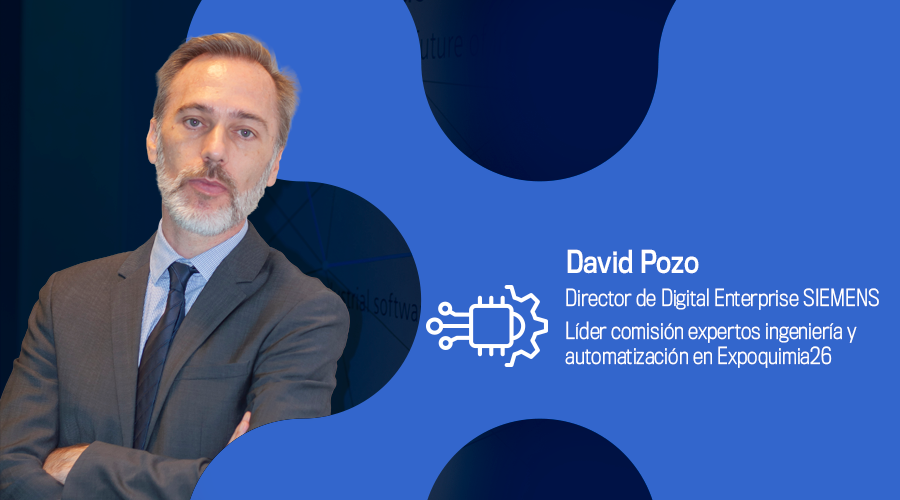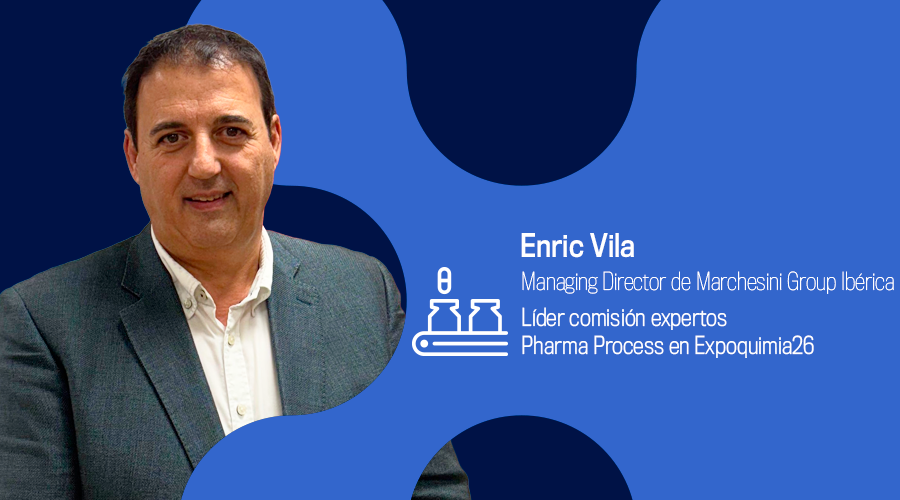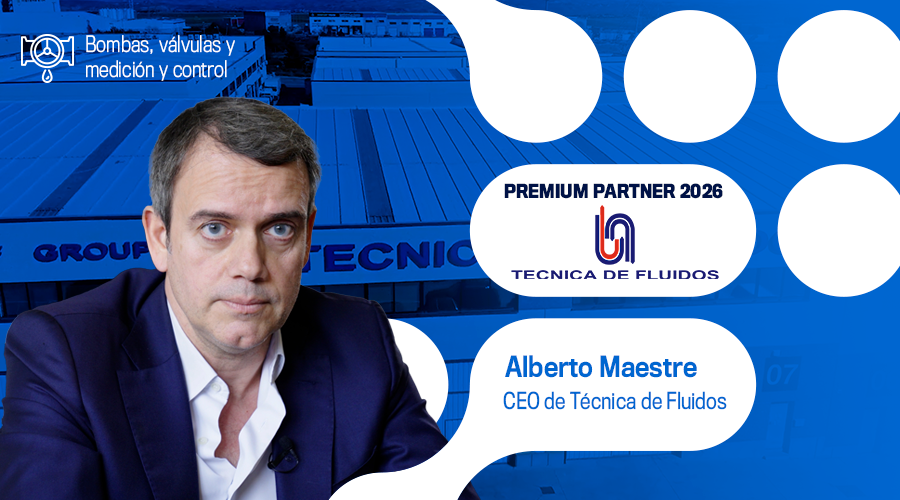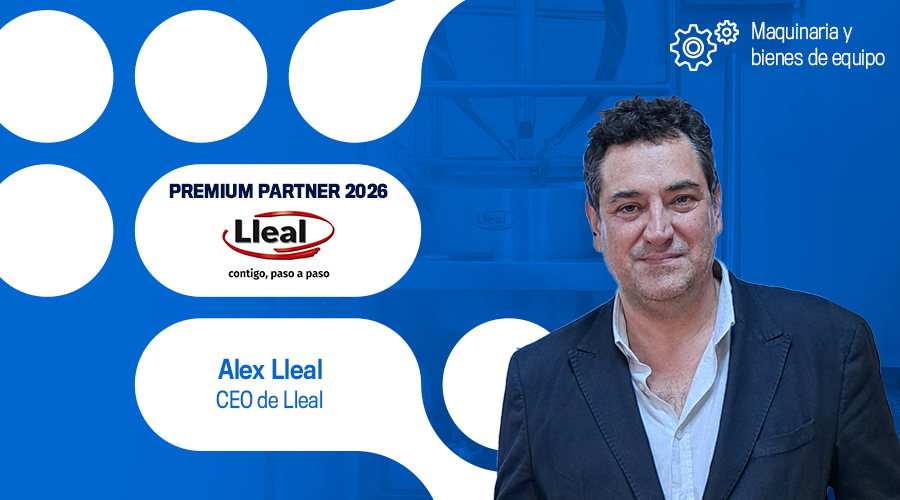Interview with David Pozo, leader of the Commission of Engineering and Automation Experts of Expoquimia
David Pozo moves naturally in the universe of industry 4.0. As leader of the Expoquimia Engineering and Automation Expert Committee and Director of Digital Enterprise at SIEMENS, he knows first-hand the challenges and opportunities posed by digital transformation. Her day-to-day life spans digitalization projects, IoT solutions, and automation processes, allowing her to provide a comprehensive and actionable view of how businesses can adapt and thrive in an increasingly connected environment.
The chemical industry is experiencing a moment of accelerated change. How are new technologies helping the sector to gain in sustainability, efficiency and competitiveness?
Digitalisation and automation make it possible to optimise processes, reduce energy consumption and improve traceability in a robust and secure way. Disciplines such as artificial intelligence and digital twins help to anticipate incidents and make more agile and accurate decisions.
In parallel, technologies such as carbon capture, chemical recycling and the use of renewable energies are reducing the environmental footprint of the sector. These solutions not only respond to climate objectives, but also strengthen the resilience and industrial autonomy of companies in the chemical sector.
In forums such as Expoquimia, we see how these innovations are already being successfully applied, demonstrating that sustainability and competitiveness can go hand in hand.
From the field of engineering and automation, what do you consider to be the main challenges facing the chemical industry today?
One of the main challenges is the decarbonisation of processes, which requires redesigning plants and adopting technologies such as electrification, green hydrogen or CO₂ capture to meet environmental objectives.
Another key challenge is digital integration. The convergence between the IT and OT worlds is becoming more and more evident and necessary. Although many companies have begun their transformation, there is still a long way to go, from supporting high-fidelity simulations, to adopting flexible and adaptive control systems, and incorporating new communication possibilities that enable advanced analytics that facilitate a more efficient, secure and flexible operation.
I would highlight the management of variability in energy demand and costs, especially from the European point of view. The automation layer should help quickly adapt production, optimize resources, and reduce the impact of market volatility.
Finally, training and attracting talent specialized in automation and digitalization is essential to sustain this evolution. There can be no digitalisation without the talent that accompanies the chemical sector in this adventure.
Digitalization is advancing, but not always at the same pace. What cultural or structural barriers still prevent many companies from adopting profound changes in their processes?
In cultural challenges we find the usual suspects: resistance to change, lack of confidence in the strategic relevance of digitalization, the scarcity of references that allow us to evaluate the returns on investment (a critical factor especially for SMEs), the prioritization of technology over the precise diagnosis of the challenge to be solved, …
From a more structural point of view, I would add the lack of qualified personnel, and the difficulty of integrating new solutions with legacy systems.
We must not forget the fragmentation of the sector either, as not all companies have access to the same resources or capabilities to address a profound digital transformation. Overcoming these barriers requires leadership, sectoral collaboration and public policies that promote innovation and specialized training.
Of course, government plans to promote the digital transformation of the different sectors of our industry, and especially the chemical sector, are always well received.
Simulation and the digital twin are gaining prominence. What potential do these tools have in the optimization and control of industrial processes?
Simulation and digital twin technologies are revolutionizing the way industrial processes are designed, controlled, operated, and optimized, especially in complex industries such as chemicals. At Siemens, these tools are an essential part of our industrial digitalization strategy through our Xcelerator portfolio.
The digital twin is a dynamic virtual replica of a product, process, production line or entire plant, which can then be fed with real-time data to act as an assistant. It allows simulating scenarios, anticipating failures, optimizing operational parameters and validating decisions without interrupting or altering physical production.
These solutions allow from the validation of automation (what we call virtual commissioning), operation training and predictive analysis and intelligent maintenance.
To do this, our distributed control integrates advanced simulation, both process and automation, offering a complete view of the life cycle of our assets.
In short, the digital twin not only improves control and efficiency, but also accelerates innovation, reduces risks and allows for more accurate decision-making.
How can engineering companies act as true facilitators of the digital transformation of the process industry?
They have a key role to play as catalysts for transformation. On the one hand, there is its ability to integrate the various technologies, on the other, engineering provides a transversal vision that connects design, operation and maintenance. Sometimes they also act as agents of cultural change, leading innovation projects. They are the point of connection between technology and its practical application and at Siemens we are fully aware of their leading role in this field.
In such a competitive global context, what role do advanced automation, robotics and IoT play in ensuring safer, more flexible and traceable production?
These emerging technologies are key to offsetting less favourable structural factors in Europe, such as labour costs or excessive regulation. Advanced automation and robotics make it possible to replace repetitive or dangerous tasks, freeing up talent for more value-added functions.
Industrial IoT, coupled with data analytics, improves traceability and real-time decision-making, resulting in safer, more flexible, and more efficient processes. In addition, collaborative robotics and autonomous systems are redefining production, allowing it to adapt quickly to changes in demand or the supply chain.
In short, these technologies not only optimise operating costs, but also allow Europe to compete in quality, innovation and sustainability, equalling or even surpassing economies with more obvious labour advantages.
Aware of the importance of these emerging technologies, Siemens inaugurated the Digital Experience Center (DeX) in Barcelona just over a year and a half ago, a pioneering international competence center for the development of flexible manufacturing solutions (AGVs, AMRs, fleet management, etc.).
Artificial intelligence is making a strong entry into the process industry. In which specific areas do you see the greatest impact or potential for improvement?
Artificial intelligence (AI) is transforming the process industry on multiple levels, and at Siemens we want to lead this evolution with solutions applied directly on the shop floor.
Platforms such as Senseye make it possible to anticipate failures before they occur, reducing unplanned downtime by up to 30% and extending the useful life of assets.
We can also optimize processes in real time with solutions such as gPROMS, which through high-fidelity models allow operating parameters to be adjusted dynamically, improving energy efficiency, product quality and process stability.
Through Industrial Copilot, we facilitate the work of configuration and code generation while supporting the operation and diagnosis of incidents in the production environment
To what extent has industrial cybersecurity become a strategic factor in ensuring the continuity and reliability of production?
Industrial cybersecurity is essential for operational continuity and production reliability. As we said before, in an environment where the IT and OT worlds are interconnected, any vulnerability can result in plant shutdowns, loss of sensitive data or even physical security risks.
We approach it with a comprehensive approach, which allows us to anticipate threats and protect critical infrastructures. In addition, the company highlights that digitalization and cybersecurity are two sides of the same coin: you cannot advance in automation, IoT or artificial intelligence without a solid protection strategy.
Cybersecurity is also key to complying with increasingly demanding regulations and maintaining the trust of customers and partners. In short, investing in cybersecurity not only protects assets, but also guarantees the resilience and competitiveness of the chemical industry in the long term.
What kind of talent does the sector need today to drive this digital transformation and how can companies attract and integrate new profiles?
I would say hybrid talent, which combines technical knowledge of the sector, understanding the production processes and their demands, with advanced digital skills.
To attract this talent, companies must opt for collaborative environments that connect industry, universities and technology centres. Initiatives such as Siemens Xcelerator and co-creation programs with students allow professionals to be trained from an early stage.
In addition, it is key to promote a culture of innovation and diversity, which motivates young people to specialise in STEM disciplines and facilitates the integration of new profiles into multidisciplinary teams. Continuous training, project-based learning, and organizational flexibility are essential tools for retaining talent and accelerating transformation.
Expoquimia 2026 will be a showcase of solutions for a more digital and sustainable industry. What message or priorities does the Expoquimia Engineering and Automation Experts Committee want to convey to the sector as a whole?
From the Commission we want to convey a clear message: digital transformation is not an option, but a strategic necessity to guarantee the competitiveness, sustainability and resilience of the process industry in Europe.
At Expoquimia 2026, we are committed to making visible how emerging technologies can generate a sustainable competitive advantage. Our goal will be to inspire the sector to accelerate its transition to smarter, more connected and sustainable models, fostering collaboration in ecosystems. We want Expoquimia to be the meeting point where specific solutions, success stories and strategies are shared that allow the chemical industry to lead change in an increasingly demanding global environment.





